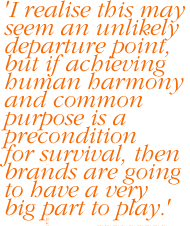

 |
 |
Chapter summary
Brand Sustainability: What is to be done?
Imagine the life of the earth as a single day. In the last 400th of a second of that day we have directly altered 47% of the earth’s land area in the name of commerce and agriculture, but even so, 900 million people are still malnourished, 1.2 billion lack clean water and 2 billion have no access to sanitation.
We cannot take it for granted that governments will suddenly acquire the clarity insight and commonality of belief to see a process of renovation to its end. Unless we accept our joint and several liability for this future and begin to address the sustainability of all human systes, we stand little chance of tackling the most complex system of all - our symbiosis with spaceship earth…destination unknown…arrival time yet to be announced.
Against this apocolyptic backdrop, how does a 60 year-old global CEO promise a bright future and possibly a pension to his 16 year-old apprentice, or any future at all to the ten year-old enslaved employees of his suppliers’?
How does he create a sustainable future for his organisation and those to whom it has made explicit or implicit promises? He must start by building a sustainable brand.
The role of the ethosystem
Start with branding? I beg my pardon! Of course, I realise this may seem an unlikely departure point, but as my co-authors have pointed out, in psychological terms, they are supremely effective vessels of complex meaning. If achieving human harmony and common purpose is a precondition for survival, then brands are going to have a very big part to play.
Brands frame our understanding of the world. Brands are simply ideas with names on. They carry information and context and purpose from one person to the next. Brands drive relationships; relationships liberate knowledge; knowledge generates insight; insight drives innovation, innovation drives transactions, transactions create value, which reframes the brand and so on, and so on, ad finitum humanensis. Within organisations as in nations, brand-affinities condition the way humans relate to one another. They help set the terms of their collaborations and their mutual expectations.
If knowledge is to be turned into insight and thence into smarter decisions, then responsible brands must be there to guide and inspire us. To save the ecosystem we must first salvage our ethosystem – with purposeful brands at its centre.
“The steps are laid down by the prophet who says, ‘unless you believe, you shall not understand’.” St Augustine, De Libero Arbitrio
Read more in the full book
Next chapter: Transparency or Not? Brand Inside:Brand Outside
